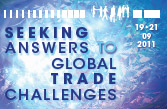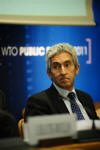|
|
Are FAO/WHO pesticide standards distorting trade and increasing food costs? |
||||
 |
|||||
|
|
Agrochemicals are one of the most important production inputs in modern agriculture. Their price to farmers depends largely on the level of competition found in the market. Higher food production costs usually result in higher food prices. Therefore, standard-setting in this field should be science-based and should not introduce unjustified market access barriers to competitive crop protection products. FAO/WHO pesticide specifications are intended to serve as international standards of quality to be used in national technical regulations. Under the “new procedure” such standards are proposed by a single company for each active ingredient, contain undisclosed information claimed as intellectual property, and confer a global monopoly in conformity assessment to a single entity (FAO/WHO JMPS). Changes in the specification can only be requested by the manufacturer who proposed the standard. This panel session will address the extent to which FAO/WHO pesticide specifications are distorting trade in crop protection products and their possible effect on food production costs, evaluate the degree to which such standards induce Member States to enter into conflict with WTO Agreements (such as the TBT and SPS Agreements), and discuss the necessity of all elements and characteristics of these standards. The main objective will be to explore possible solutions to enhance food security for a growing world population.
|
|
|||
 |
|||||
INTERNET LINKS
|
|
||||
ARTICLES on the NET
Roman Macaya: The Great Debater - Farm Chemicals Internationalwww.farmchemicalsinternational.com › ... › Top Generics › 2010 “AgroCare is an idea whose time had come,” Macaya says. “All over the world, there are discussions going on and decisions being made that affect the generic ...
|
|||||
BIBLIOGRAPHY
Biographies of Moderator and Speakers Are FAO/WHO pesticide standards distorting trade and increasing food costs? Session # 25 - Sub-Theme I: Food Security - September 20, 2011 - 14:00 – 16:00 - Meeting Room E
Moderator: Peter Lunenborg (NGO representative). Attorney and Economist who serves as Researcher at South Centre´s Trade for Development Programme (Geneva, Switzerland). Peter researches issues such as Agriculture and non-Agricultural market access, benchmarking for development and covers developments at WTO and Free Trade Agreements.
Panellists:
Dr. Carlos M. Correa (Academic).Professor from the University of Buenos Aires, Argentina, and Director of the Center for Interdisciplinary Studies on Industrial Property and Economics and of the Post-graduate Course on IntellectualProperty at the Law Faculty, University of Buenos Aires. He has been a visiting professor in post-graduate courses of several universities and consultant to UNCTAD, UNIDO, UNDP, WHO, FAO, IDB, INTAL, World Bank, SELA, ECLA, UNDP and other regional and international organizations on matters related to intellectual property, trade and regional and bilateral agreements.
Dr. Roman F. Macaya (Business Community) President of AgroCare (Brussels, Belgium), the global Association that represents the generic agrochemical industry. Agro Care is based in Brussels, Belgium and represents 865 independent manufacturers of crop-protection products in Europe, Latin America, India and China. AgroCare participates in international discussions on trade, regulations and intellectual property issues that relate to crop-protection products. Dr. Macaya is a former President of ALINA (Miami, Florida), the Latin American Association of National Agrochemical Industries, and a current Director of the Chamber of Agriculture in Costa Rica. Roman has a Ph.D. in Biochemistry (UCLA, California, USA), an MBA in Health Care Management (Univ. of Pennsylvania, Pennsylvania, USA) and B.A. in Chemistry (Middlebury College, Vermont, USA).
Dr. Keith Solomon (Academic). Professor Emeritus and Associate Graduate Faculty in the School of Environmental Sciences at the University of Guelph (Canada). He is also Director of the Centre for Toxicology. He directs an active program of research into the fate and effects of pesticides and other substances in the environment, exposure of humans to pesticides and industrial chemicals, and risk assessment. He has, and continues to serve on several advisory committees on matters related to environmental toxicology and pesticides in Canada, the USA, and internationally. He is a member of the Society of Environmental Toxicology and Chemistry, the American Chemistry Society (Agrochemistry and Environmental Chemistry), and the American Association for the Advancement of Science. He is the recipient of the 1993 Society for Environmental Toxicology and Chemistry-ABC Laboratories award for Environmental Education, was elected as a Fellow of the Academy of Toxicological Sciences in December 1999, and is recipient of the 2002 American Chemical Society International Award for Research in Agrochemicals. In 2006, he was awarded the SETAC Europe Environmental Education Award and the Society for Environmental Toxicology and Chemistry Founders Award.
Mr. StéphaneDelautre-Drouillon (Farming Community) Secretary General of AUDACE (France). Stéphane read modern history and economics (Cambridge 1976-1983) and thereafter, from 1986, held different positions within the plant protection generics industry. He joined the Paris based ‘Association of Users and Distributors of AgroChemicals in Europe’ AUDACE in 1998 as Secretary General. In this capacity, he created a community wide base for the organisation including farmers, their trade unions and their ‘non-aligned’ commercial and industrial partners. He also established productive channels of communication with many of the European Commission’s services, the European Parliament as well as member States competent authorities. He took part in the drafting of new regulations at national and community level including the new market access regulation and sustainable use directive.Amongst others, he successfully headed actions to obtain firstly the suspension of Council Regulation 1683 imposing a definitive anti-dumping duty on imports of glyphosate from the PRC and secondly, before the European Court of First Instance, its annulment in respect of one major Chinese producer.
|
Dr. Carlos M. Correa |
||||


